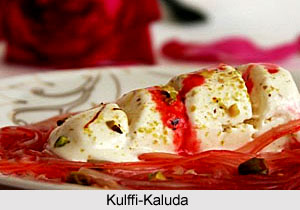 Parsi food has changed considerably with the passage of time. Previously, like the Hindus, they used to have their meals sitting on the ground, and the viands were served to them in a brass dish, on which they were all spread out at the same time, a practice still followed among the poorer classes. The affluent Parsis have adopted the habit of eating on table and chair which is somewhat similar to that of a European dinner. In the large parties, the table is spread out in the English fashion, instead of as formerly, when hundreds sat in a line in rows upon an oblong sheet of cotton cloth laid upon the floor, each eating his food off a plantain leaf upon which it was laid out.
Parsi food has changed considerably with the passage of time. Previously, like the Hindus, they used to have their meals sitting on the ground, and the viands were served to them in a brass dish, on which they were all spread out at the same time, a practice still followed among the poorer classes. The affluent Parsis have adopted the habit of eating on table and chair which is somewhat similar to that of a European dinner. In the large parties, the table is spread out in the English fashion, instead of as formerly, when hundreds sat in a line in rows upon an oblong sheet of cotton cloth laid upon the floor, each eating his food off a plantain leaf upon which it was laid out.
Normally, rich and affluent Parsis take three meals a day. In the morning, after completing their ablutions, they take their breakfast which consists of breads and butter, tea and eggs. For lunch, the principal dishes include rice and curry, with vegetables, mutton and fish. The poorer people of the Parsi community however limit their dishes with simple rice and `doll`. Doll is a thick grain curry. They take a cup of tea in the afternoon, and dinner, which is the most significant meal of the day, is served in the evening. The dinner consists of meat or poultry, fish, eggs, vegetables, sweets and fruit. The custom of the Parsis is to acknowledge before as well as at the end of each meal, with grateful thanks, to the kindness of Providence who provides them with their daily bread.
The Parsi men used to take their meals without their female counterparts. The male members of the family either supped separately or together, and the female members also did the same.  This custom was certainly adapted from the Hindus, since the ancient Persians observed no such distinction. It is proved by history that the ancestors of the Parsis not only had their dinner with their mothers, wives, and sisters, but also went out with their ladies to feasts. However, presently among Parsis, both males and females take their meals together.
This custom was certainly adapted from the Hindus, since the ancient Persians observed no such distinction. It is proved by history that the ancestors of the Parsis not only had their dinner with their mothers, wives, and sisters, but also went out with their ladies to feasts. However, presently among Parsis, both males and females take their meals together.
Besides the regular food, there are a host of festive foods for the Parsis. Sweets are an inseparable part of the festivities. Sev, faluda, kulfi are quite popular with this community. Apart from having a sweet tooth, the Parsis are also fond of snacks, like, bhakra, khaman na lavda. Batasa and others.
The Parsis are temperate in their habits and most of them would have a glass or two of spirits or wine at dinner. They refrain from drinking anything stronger than tea during day time and consider drunkenness as the parent of many evils. The Parsis do not practice smoking either tobacco or opium, from their religious instinct which forbids them to bring fire, which they consider as pure, into the contact of mouth, which is regarded by them as impure.




















